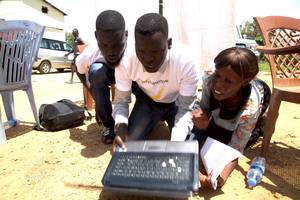July 2018
Research this month
Facilitating Financial Sustainability
"Intentional support for organization financial sustainability is a rare but critical resource to allow local organizations …

Research this month
Facilitating Financial Sustainability
"Intentional support for organization financial sustainability is a rare but critical resource to allow local organizations to carry out their missions effectively, providing a major opportunity for impact for funders willing to try flexible and deliberate sustainability support strategies."
The Facilitating Financial Sustainability program, from Peace Direct, Linc, and Foundation Center, seeks to develop and test ways that different actors can work together to improve the factors that drive local organizations’ financial sustainability.
This research series examines the factors that underlie successful CSO financial sustainability approaches for organizations in six countries. Combining qualitative analysis from in-depth interviews with CSOs and funders, as well as a first-of-its-kind quantitative analysis of thousands of grants supporting financial sustainability, the research series considers effective
strategies and approaches for organizations interested in improving CSO sustainability.
Adding up to peace: the cumulative impacts of peace initiatives
"Listening to and supporting local leadership and initiatives is appropriate for practical reasons—because it works. For many, this is also a matter of principle that has gained widespread acceptance in recent years. However, donors are still mainly channeling funding through international organizations, and partnerships continue to reflect power imbalances and external control. At the same time, it is important to recognize that in-country politics and relationships are always complex, making it difficult for outsiders to determine which voices to listen to and which local efforts to promote."
Adding up to peace, from CDA Collaborative Learning Projects, explores how multiple peace initiatives in a conflict zone combine and interact to influence peace. Drawing from 16 case studies, the book aims to provide practical lessons for policymakers and practitioners.
"If youth are given the chance": Effects of education and civic engagement on Somali youth support of political violence
"The greatest reduction in youth support for political violence comes from the combination of participation in quality secondary education (which transfers knowledge and skills needed for future employment) and civic engagement opportunities (which empower youth to positively contribute to their communities). Given that these findings hold across three different regions—Somaliland, South Central Somalia, and Puntland—we can say with some confidence that this approach can be an important strategy in efforts to combat political violence throughout Somalia, and perhaps in other contexts with similar conditions."
If youth are given the chance, from Mercy Corps, seeks to understand how education and civic enagement influcences support for political violence amoung young people in Somalia. By analysing the attitudes of young people who have gone participated in such a programme, the research demonstrates the positive impact education and civic engagement can have on support for violence.
Transformative approaches to violent extremism
"While violent extremism (VE) has indeed emerged as a new buzzword and a strong funding trend over the past few years, effective strategies for addressing the phenomenon are still being forged and need to be reviewed and tested. Violent extremism’s manifestations range widely: from foreign fighters via terrorist attacks to increasingly public violence-condoning ideology and rhetoric of both secular and religious provenance. How to deal with violent extremism, and its protagonists, is therefore also becoming a major challenge for peacebuilders and conflict transformation practitioners."
Transformative approaches to violent extremism, from Berghof Foundation, is a collection of articles from academics, practioners and policymakers exploring the concept of violent extemisms and the issues the idea presents for peacebuilding.
What is the point…if nothing changes? Current Practices and Future Opportunities to Improve Remote Monitoring and Evaluation in Syria
"Local NGOs implement most of the aid in Syria but do not have sufficient support for
organizational development. [...] Donors should increase their direct funding and support to local NGOs and civil society organizations (CSO) to improve local M&E capacity. This would not only increase the efficiency of aid dollars, but investments would spur the development of new, innovative M&E methods that are best suited to the local context."
What is the point…if nothing changes, from Building Markets looks at the challenges of effective monitoring and evaluation in the contect of the Syrian Civil War. Based on interviews with CSOs, donors, and INGOs, the research identifies some of the difficulties and opportunities, and offers recommendations on how M&E practicies could be improved.
Funding opportunities
NCMG Peace Awards
The NCMG Peace Awards recognise change agents and innovative thought leaders championing justice and peace in Africa. Deadline: 31 July 2018 Find out more
WANGO Awards Program
The World Association of Non-Governmental Organizations (WANGO) is seeking nominations for WANGO Awards Program to honor non-governmental organizations from throughout the world that demonstrate extraordinary effort, innovation, leadership, and excellence in providing service to humanity. Deadline: 15 July 2018 Find out more
From the blog

Peace as the business of the future, follow Elworthy's roadmap
As a peacebuilder in the Middle East, our local peacebuilding expert from Lebanon acknowledges that with all this turmoil around us it is hard to be optimistic. It is all the more remarkable therefore that she found a book that left her smiling and hopeful. In her review of "The Business Plan for Peace: Building a World Without War" by Scilla Elworthy, the founder of Peace Direct, Sawssan Abou-Zahr reviews the roadmap the book puts forward for peace among nations and within them. Read more »

An IT campaign to tackle hate speech and build peace online
Fake News is not just a problem in the US. Online disinformation has been blamed for fuelling violence all over the world. In South Sudan a campaign has been launched to train young people to recognise and combat online hate speech, and identify ways to build peace online. Read more »








